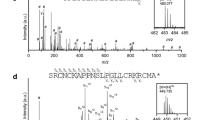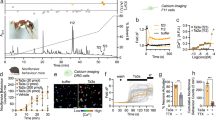Abstract
IT was determined that plain agar plates infused with spores of Bacillus subtilis could be used to determine the bacteristatic effect of the venom of Hymenoptera. Peptone–glucose nutrient paper disks wetted with bee venom and placed on the agar surface produced uniform and measurable zones of growth inhibition which varied directly with the concentration of the venom. A reverse phase, bioassay method of standardizing solutions of Hymenoptera venom is proposed and a unit of venom is defined.
This is a preview of subscription content, access via your institution
Access options
Subscribe to this journal
Receive 51 print issues and online access
$199.00 per year
only $3.90 per issue
Buy this article
- Purchase on Springer Link
- Instant access to full article PDF
Prices may be subject to local taxes which are calculated during checkout
Similar content being viewed by others
References
Haydak, M. H., Iowa State Apiarist, 119 (1951).
Stier, R. A., and Stier, R. F. E., G. P., 19, 108 (1959).
Ortel, S., and Markwardt, F., Pharmazie, 10, 743 (1955).
Kosikowski, F. V., and Ledford, R. A., J. Amer. Vet. Med. Assoc., 136, 297 (1960).
Author information
Authors and Affiliations
Rights and permissions
About this article
Cite this article
BENTON, A., MORSE, R. & KOSIKOWSKI, F. Bioassay and Standardization of Venom of the Honey Bee. Nature 198, 295–296 (1963). https://doi.org/10.1038/198295b0
Issue Date:
DOI: https://doi.org/10.1038/198295b0
This article is cited by
-
Melittin: from honeybees to superbugs
Applied Microbiology and Biotechnology (2019)
Comments
By submitting a comment you agree to abide by our Terms and Community Guidelines. If you find something abusive or that does not comply with our terms or guidelines please flag it as inappropriate.



